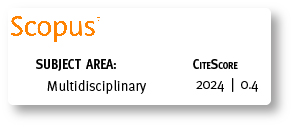Animalist art as a model for an ecocentric and postanthropocentric pedagogy
DOI:
https://doi.org/10.18537/mskn.15.01.03Keywords:
animalistic art, post-anthropocentrism, pedagogy, animals, ecocentrismAbstract
In contrast to the anthropocentrism that has dominated Western education, the aim of this work is to present the pedagogical power of animalist art in ecocentric and postanthropocentric education, especially for the care of the otherness of nature and animals. The justification of the theme lies in the need for a change of mentality in light of the dangers threatening nature. The methodology used in this work includes, on the one hand, the analysis of the concepts of care, otherness and their educational value, and, on the other hand, the intuition through the examples of animalist art itself. The conclusions are threefold. First, care is especially concerned with those who have no voice, such as nature and animals. Second, it is necessary to educate to promote the care of nature and animals. Third, animalist art is a foundation for ecocentric education.
Downloads
Metrics
References
Agamben, G. (2021). Studiolo. Trad. de M. T. D’Meza y R. Molina. Adriana Hidalgo.
Albelda, J. L. (2015). Arte, empatía y sostenibilidad. Capacidad empática y conciencia ambiental en las prácticas contemporáneas de arte ecológico. Ecozon@, 6(2), 10-25.
Arendt, H. (1958). The Human Condition. The University of Chicago Press.
Baier, A. (1985). What do women want in a moral theory? Nous, 19 (1), 3-63.
Beauvoir, S. de (2015). El segundo sexo (1949). Trad. de A. Martorell, Cátedra.
Bell, D. R. (2004). Creating green citizens? Political liberalism and environmental education. Journal of Philosophy of Education, 38(1), 37–53.
Bentham, J. (1988). The Principles of Moral and Legislation (1789). Prometheus Books.
Berger, J. (1980). About looking. Pantheon Books.
Berning, H., North, Ch., Stevens, S. y Clarke, T. (2023). Deconstructing the anthropocentrism versus ecocentrism binary through Māori oral fire traditions. Journal of Outdoor and Environmental Education, 26(2), 1-18. https://doi.org/10.1007/s42322-023-00128-2
Boff, L. (2003). El ethos que cuida. Columna semanal de Leonardo Boff en https://www.servicioskoinonia.org/boff/articulo.php?num=023.
Brown, C. (2015). Fish Intelligence, sentience and ethics. Animal Cognition, 18(1), 5-19.
Chaudhuri, U. (2017). The Stage Lives of Animals. Zooësis and Performance. Routledge.
Derrida, J. (2008). El animal que luego estoy si(gui)endo. Trad. de C. Peretti y C. Rodríguez, Trotta.
Derrida, J. (2011). Seminario. La bestia y el soberano, II. Trad. de C. Peretti y D. Rocha. Manantial.
Diller, A. (1996). The Ethics of Care and Education: A New Paradigm, its Critics, and its Educational Significance. En B. Houston, A. Diller, K. P. Morgan y M. Ayim, (eds.), The Gender Question in Education (pp. 89-104). Westview Press.
Drenthen, M. (1999). The paradox of environmental ethics; Nietzsche’s view on nature and the wild. Environmental Ethics, 21(29), 163–175.
Freire, P. (2001). Pedagogy of freedom: Ethics, democracy, and civic courage. Rowman & Littlefield.
Foucault, M. (2007). El nacimiento de la biopolítica (1978-79). Trad de H. Pons. FCE.
Gaarder, E. (2011). Women and the Animal Rights Movement. Rutgers University Press.
Gilligan, C. (1982). In a different voice: Psychological theory and women’s development. Harvard University Press.
Giroux, H. (2015). Education and the crisis of public values. Peter Lang.
Gomboeva, M. e Ivanova, Y. (2023). Animalistic style in creative practices of contemporary artists and creative industries. SHS Web of Conferences, 164, 1-8.
Groys, B. (2022). The Philosophy of Care. Verso.
Hansen, D. T. (2011). The teacher and the world: A study of cosmopolitanism as education. Routledge.
Haraway, D. (2008). When Species Meet. University of Minnesota Press.
Isolotto, U. (2022). Cottagecore Centaurs. Interview with Louise Steiwer. Nordic Art Review-Kunstkritikk. https://kunstkritikk.com/cottagecore-centaurs/
Kennedy, B. W. y Froeschl, K. (2018). Education and Training. En R. H. Weichbrod et al. (eds.), Management of animal care and use programs in research, education, and testing (pp. 221-266). Taylor & Francis.
Kerr, M. (2004). Extreme Makeovers. Art on Paper Magazine, 8(6), 28-29.
Kopnina, H., Gray, J., Lynnc, W., Heisterd, A. y Srivastava, R. (2023). Uniting Ecocentric and Animal Ethics: Combining Non-Anthropocentric Approaches in Conservation and the Care of Domestic Animals. Ethics, Policy and Environment, 26(2), 265-286. https://doi.org/10.1080/21550085.2022.2127295
Matthews, F. (2001). Deep ecology. En D. Jamieson (ed.), A Companion to Environmental Philosophy (pp. 218–231). Blackwell.
Naess, A. (1989), Ecology, Community and Lifestyle. Cambridge University Press.
Noddings, N. (1984). Caring: A feminine approach to ethics and moral education. University of California Press.
Noddings, N. (1986). Fidelity in teaching, teacher education, and research for teaching. Harvard Educational Review, 56(4), 496-510.
Noddings, N. (1998). Caring. En P. Hirst y P. White (eds.), Philosophy of Education. Major Themes in the Analytic Tradition II (pp. 40–50). Routledge.
Oldfield, A. (1990). Citizenship and Community. Civic Republicanism and the Modern World. Routledge.
Piccolo, J., Taylor, B., Washington, H., Kopnina, H. y Gray, J. (2022). Nature’s contributions to people and peoples moral obligations to nature. Biological Conservation, 270, 1-8. https://doi.org/10.1016/j.biocon.2022.109572
Postma, D. W. (2006). Why care for nature? In search of an ethical framework for environmental responsibility and education. Springer.
Protágoras de Abdera (1996). Dissoi Logoi. Textos relativistas. Akal.
Puleo, A. H. (2015). El ecofeminismo y sus compañeros de ruta. En A. H. Puleo (ed.), Ecología y género en diálogo interdisciplinar (pp. 387-405). Plaza y Valdés.
Riechmann, J. (2018). Una utopía ética desmadrada: la intervención animalista positiva en la naturaleza. Revista de Bioética y Derecho, (44), 19-40.
Rifkin, J. (2010). The Empathic Civilization. The Race to Global Consciousness in a Word of Crisis. Polity Press.
Rothko, M. (2007). Escritos sobre arte. Trad. de M. López. Paidós.
Sevenhuijsen, S. (2018). Care and attention. South African Journal of Higher Education, 32(6), 1–14.
Shiva, V. (1998). El saber propio de las mujeres y la conservación de la biodiversidad. En M. Mies y V. Shiva (eds.), La praxis del ecofeminismo. Biotecnología, consumo y reproducción (pp. 13-26). Icaria.
Singer, P. (1993). Practical Ethics. Cambridge University Press.
Slote, M. (2007). The ethics of care and empathy. Routledge.
Smith, M. J. (1998). Ecologism. Towards Ecological Citizenship. Open University Press.
Tafalla, M. (2019). Ecoanimal: una estética plurisensorial, ecologista y animalista. Plaza y Valdés.
Tafalla, M. (2022). Filosofía ante la crisis ecológica. Una propuesta de convivencia con las demás especies: decrecimiento, veganismo y rewilding. Plaza y Valdés.
Tronto, J. (2013). Caring democracy: Markets, equality, and justice. New York University Press.
Waghid, Y. (2019) Towards a Philosophy of Caring in Higher Education. Palgrave MacMillan.
Published
How to Cite
Issue
Section
License
Copyright (c) 2024 Carmen Gutiérrez-Jordano

This work is licensed under a Creative Commons Attribution-NonCommercial-ShareAlike 4.0 International License.
Copyright © Autors. Creative Commons Attribution 4.0 License. for any article submitted from 6 June 2017 onwards. For manuscripts submitted before, the CC BY 3.0 License was used.
![]()
You are free to:
 |
Share — copy and redistribute the material in any medium or format |
 |
Adapt — remix, transform, and build upon the material for any purpose, even commercially. |
Under the following conditions:
 |
Attribution — You must give appropriate credit, provide a link to the licence, and indicate if changes were made. You may do so in any reasonable manner, but not in any way that suggests the licenser endorses you or your use. |
| No additional restrictions — You may not apply legal terms or technological measures that legally restrict others from doing anything the licence permits. |









